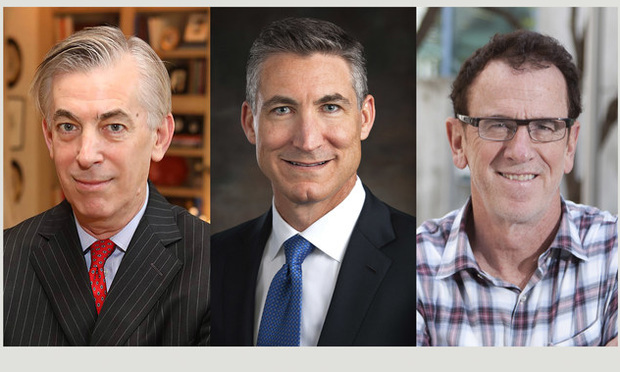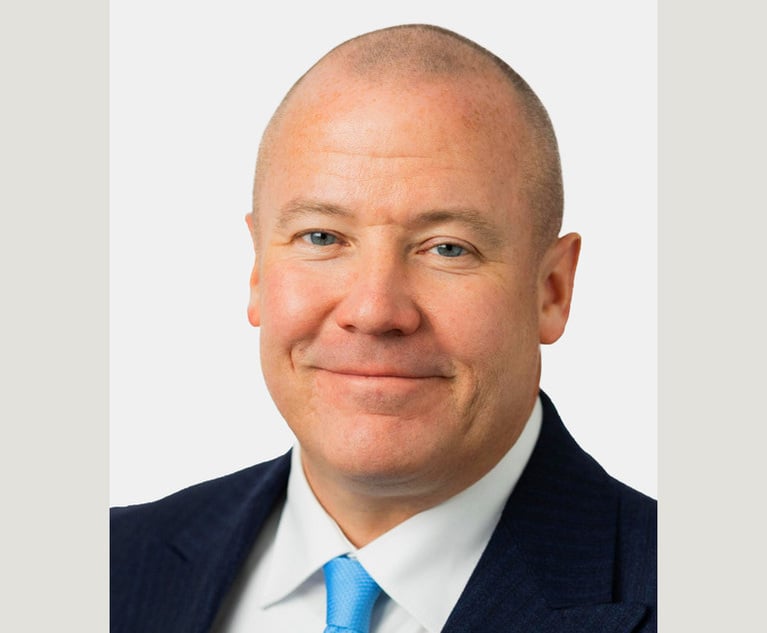Rivals Say Kirkland's Push Into Contingency Fee Litigation Not Threatening
Trial lawyers said Kirkland, for all its resources, comes into a contingency fee practice with some disadvantages.
July 14, 2019 at 07:00 PM
5 minute read
The original version of this story was published on The American Lawyer
 Neal Manne (from left) of Susman Godfrey, Jason Peltz of Bartlit Beck and John B. Quinn, of Quinn Emanuel. (Courtesy photos)
Neal Manne (from left) of Susman Godfrey, Jason Peltz of Bartlit Beck and John B. Quinn, of Quinn Emanuel. (Courtesy photos)
In the wake of Kirkland & Ellis' announcement that it is “doubling down” on contingency-fee litigation, you might expect lawyers who take on such matters to worry about competing for clients with Big Law's 600-pound gorilla.
But in interviews, leading litigators at other firms said they're not sweating the news. They said there's enough work for everyone and that Kirkland's big client base and full-service offering could work against the firm in some ways.
“We don't view it as threatening in any way,” said Neal Manne, the Houston-based managing partner of Susman Godfrey. He said Susman Godfrey has a good brand, runs cases efficiently and his firm is already comfortable with alternative fees—less than 20% of its revenue comes from billable hours, he said. “We don't view [Kirkland] as a competitor in any way that would affect our business model or our approach,” he said.
Jason Peltz, whose trial-oriented firm Bartlit Beck was started by former Kirkland litigators with a distaste for the billable hour, said Kirkland's announcement “doesn't worry me at all.” He said Kirkland is more associate-heavy than his firm and staffs matters differently.
“I think there are enough cases for the best lawyers out there,” Peltz added.
For some, the Kirkland announcement was seen more as a marketing play rather than a new strategic direction.
“I don't think this is an event,” John Quinn, the managing partner of Quinn Emanuel Urquhart & Sullivan, said in an email. “I very much doubt that this means that [Kirkland & Ellis] would now accept a good [contingency fee] case that they wouldn't have accepted six months ago.”
Trial lawyers contacted for this article said they welcome the competition, but noted that Kirkland—for all its resources—has some disadvantages. One is the risk of conflicts; Kirkland represents a wide array of the biggest businesses in America on litigation and corporate matters and can't turn around and sue them.
Also, both Peltz and Manne noted that their own firms benefit from referrals from other law firms that don't have to worry about losing a client for other legal services. In other words, firms may be wary of sending a client to a full-service firm like Kirkland for a litigation matter, fearful of losing the entire client relationship.
Eyeing Profitability
Regardless of how the firm's news was received, it's now clear that Kirkland—known for mounting huge defense cases for the likes of BP in the aftermath of the Deepwater Horizon disaster and General Motors after its faulty ignition switches led to numerous deaths—wants the market of potential plaintiffs to know that it is open to going to bat for them.
Kirkland's announcement this month comes less than three years after ALM reported a partner profit reallocation hurt the pay of some Kirkland litigators, as their peers in private equity and M&A contribute a growing share to the firm's bottom line.
In recent years, there has been an industrywide drop in demand for litigation. It's not clear how demand for Kirkland's litigators has fared, but Kent Zimmermann, a law firm consultant with the Zeughauser Group, noted that going after more plaintiffs' cases could mean more work for the firm's litigators. He said taking on more contingency cases was a high-risk, high-reward strategy, but said the firm has probably checked its data and has been satisfied with the results.
“They already have a record of success [with] some big plaintiffs-side wins at their back, and it's unsurprising that they want more,” he said.
Former Kirkland lawyers said firm leaders have eyed the profitability of plaintiffs' firms like Quinn Emanuel with some jealousy. (Quinn Emanuel's profit margin last year was 61%, compared with Kirkland's at 58%, according to ALM data.) And the ex-Kirklanders note that the Chicago-founded firm has had great success taking the plaintiffs' side in the past.
Just take the case of bankrupt chemical company Tronox. Kirkland represented a litigation trust that sued Kerr McGee for dumping its environmental liabilities on Tronox before spinning it off, freeing itself of the toxic burden and setting up its corporate offspring to fail. The case ended in a $5 billion settlement, and Kirkland got paid $93 million; $70 million of that was a contingency fee.
Reed Oslan, who leads Kirkland's special fee arrangement committee, said at a conference earlier this year that alternative-fee matters were “the most profitable part of our firm, by a large margin,” although he noted that it was a small portion of the firm's business.
Kirkland has declined to say how much of its revenue comes from alternative fee arrangements and declined to comment for this article. The firm was the highest grossing of the entire Am Law 200 last year, generating $3.757 billion.
Still, former Kirkland partners said alternative fees have ebbed and flowed. They praised Oslan, saying his support for contingency fees, hybrid fees and arrangements blending fees from a portfolio of cases has resulted in major successes.
But only time will tell how far Kirkland pushes the contingency fee practice. One source said there was a concern among some litigators inside Kirkland that the entire firm was watching a lawyer's contingency fee matters and a worry that large risk-taking wouldn't be rewarded.
This content has been archived. It is available through our partners, LexisNexis® and Bloomberg Law.
To view this content, please continue to their sites.
Not a Lexis Subscriber?
Subscribe Now
Not a Bloomberg Law Subscriber?
Subscribe Now
NOT FOR REPRINT
© 2025 ALM Global, LLC, All Rights Reserved. Request academic re-use from www.copyright.com. All other uses, submit a request to [email protected]. For more information visit Asset & Logo Licensing.
You Might Like
View All
Litigation Leaders: Quinn Emanuel's Michael Carlinsky on Training Associates to Think and Act Like Trial Lawyers

Litigation Leaders: Casey Laffey of Reed Smith on Being 'More Prepared Than the Other Side'

Litigation Leaders: Adam Siegel of Freshfields on Four 'Cs' of the Firm's Litigation Practice
Trending Stories
- 1Uber Files RICO Suit Against Plaintiff-Side Firms Alleging Fraudulent Injury Claims
- 2The Law Firm Disrupted: Scrutinizing the Elephant More Than the Mouse
- 3Inherent Diminished Value Damages Unavailable to 3rd-Party Claimants, Court Says
- 4Pa. Defense Firm Sued by Client Over Ex-Eagles Player's $43.5M Med Mal Win
- 5Losses Mount at Morris Manning, but Departing Ex-Chair Stays Bullish About His Old Firm's Future
Who Got The Work
J. Brugh Lower of Gibbons has entered an appearance for industrial equipment supplier Devco Corporation in a pending trademark infringement lawsuit. The suit, accusing the defendant of selling knock-off Graco products, was filed Dec. 18 in New Jersey District Court by Rivkin Radler on behalf of Graco Inc. and Graco Minnesota. The case, assigned to U.S. District Judge Zahid N. Quraishi, is 3:24-cv-11294, Graco Inc. et al v. Devco Corporation.
Who Got The Work
Rebecca Maller-Stein and Kent A. Yalowitz of Arnold & Porter Kaye Scholer have entered their appearances for Hanaco Venture Capital and its executives, Lior Prosor and David Frankel, in a pending securities lawsuit. The action, filed on Dec. 24 in New York Southern District Court by Zell, Aron & Co. on behalf of Goldeneye Advisors, accuses the defendants of negligently and fraudulently managing the plaintiff's $1 million investment. The case, assigned to U.S. District Judge Vernon S. Broderick, is 1:24-cv-09918, Goldeneye Advisors, LLC v. Hanaco Venture Capital, Ltd. et al.
Who Got The Work
Attorneys from A&O Shearman has stepped in as defense counsel for Toronto-Dominion Bank and other defendants in a pending securities class action. The suit, filed Dec. 11 in New York Southern District Court by Bleichmar Fonti & Auld, accuses the defendants of concealing the bank's 'pervasive' deficiencies in regards to its compliance with the Bank Secrecy Act and the quality of its anti-money laundering controls. The case, assigned to U.S. District Judge Arun Subramanian, is 1:24-cv-09445, Gonzalez v. The Toronto-Dominion Bank et al.
Who Got The Work
Crown Castle International, a Pennsylvania company providing shared communications infrastructure, has turned to Luke D. Wolf of Gordon Rees Scully Mansukhani to fend off a pending breach-of-contract lawsuit. The court action, filed Nov. 25 in Michigan Eastern District Court by Hooper Hathaway PC on behalf of The Town Residences LLC, accuses Crown Castle of failing to transfer approximately $30,000 in utility payments from T-Mobile in breach of a roof-top lease and assignment agreement. The case, assigned to U.S. District Judge Susan K. Declercq, is 2:24-cv-13131, The Town Residences LLC v. T-Mobile US, Inc. et al.
Who Got The Work
Wilfred P. Coronato and Daniel M. Schwartz of McCarter & English have stepped in as defense counsel to Electrolux Home Products Inc. in a pending product liability lawsuit. The court action, filed Nov. 26 in New York Eastern District Court by Poulos Lopiccolo PC and Nagel Rice LLP on behalf of David Stern, alleges that the defendant's refrigerators’ drawers and shelving repeatedly break and fall apart within months after purchase. The case, assigned to U.S. District Judge Joan M. Azrack, is 2:24-cv-08204, Stern v. Electrolux Home Products, Inc.
Featured Firms
Law Offices of Gary Martin Hays & Associates, P.C.
(470) 294-1674
Law Offices of Mark E. Salomone
(857) 444-6468
Smith & Hassler
(713) 739-1250







